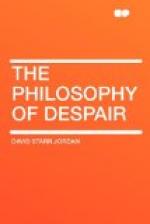What matter is it that time does not end with us? Neither with us does history begin. An Emperor of China once decreed that nothing should be before him, that all history should begin with him. But he could go no farther than his own decree. Who are you that would be Emperor of China?
“The eternal Saki from that bowl hath poured Millions of bubbles like us and shall pour.”
Why not? Should life stop with you? What have you done that you should mark the end of time? If you have played your part in the procession of bubbles, all is well, though the best you can do is to leave the world a little better for the next that follows.
If you have not made life a little richer and its conditions a little more just by your living you have not touched the world. You are indeed a bubble. If some kind friend somewhere “turn down an empty glass,” it will be the best monument you deserve. But to have had a friend is to leave the glass not wholly empty, for life is justified in love as well as in action.
The words of Omar need to be read with the rising inflection, and they become the expression of exultant hopefulness.
“The eternal Saki from that bowl hath poured Millions of bubbles and shall pour!”
Small though we are the story is not all told when we are dead. The huge procession goes on and shall go on, till the secret of the grand symphony of life is reached.
“A single note in the Eternal Song
A perfect Singer hath had need for me.”
* * *
“I do rejoice that when of Thee and Me
Men speak no longer, yet not less but more
The Eternal Saki still that bowl shall fill
And ever fairer, clearer bubbles pour.”
In the same way we must read with the rising inflection the lines of Tennyson:
“I falter when I firmly trod,
And falling with my weight of cares,
Upon the World’s great altar-stairs
That slope through darkness, up to god!”
Read these words with courage, and with the upward turn of the voice at the end. It is no longer in the darkness that we falter. The great altar-stairs of which no man knows the beginning nor the end, do not spring from the mire nor end in the mists. They “slope through darkness up to God,” and no one could ask a stronger expression of that robust optimism which must be the mainspring of successful life.
*** End of the project gutenberg EBOOK, the philosophy of despair ***
This file should be named phdes10.txt or phdes10.zip Corrected editions of our eBooks get a new number, phdes11.txt versions based on separate sources get new letter, phdes10a.txt
Project Gutenberg eBooks are often created from several printed editions, all of which are confirmed as Public Domain in the us unless a copyright notice is included. Thus, we usually do not keep eBooks in compliance with any particular paper edition.




